Key takeaways:
- Feminist fashion emphasizes identity, empowerment, and social justice, encouraging consumers to align their wardrobe choices with their values.
- Supporting ethical brands fosters transparency, sustainable practices, and a sense of responsibility among consumers.
- Engaging with the community and sharing experiences can amplify advocacy efforts and create a supportive network around ethical fashion.
- Awareness and education about the fashion industry’s impact can empower consumers to make informed choices, promoting a more ethical future.
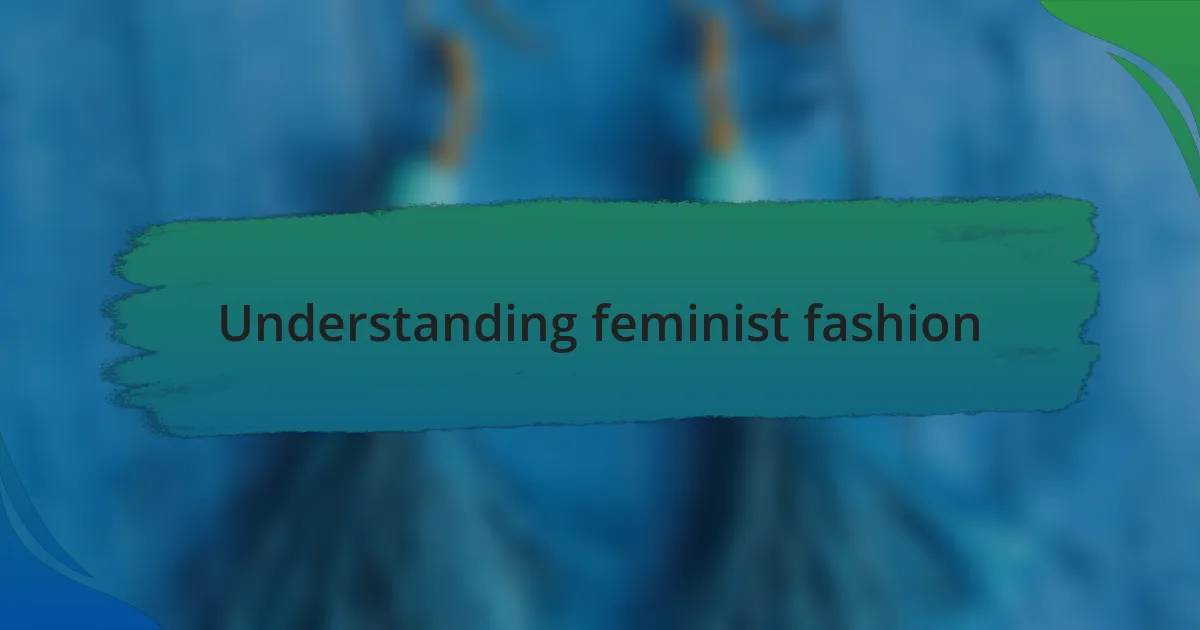
Understanding feminist fashion
Feminist fashion is a vibrant expression of identity and empowerment. It goes beyond clothing; it embodies the values of equality, inclusivity, and social justice. When I first started exploring this realm, I was struck by how brands could weave social consciousness into the fabric of their offerings.
I often wonder how the clothes we wear can speak volumes about our values. Feminist fashion challenges traditional norms and embraces diversity, urging us to consider who benefits from our style choices. I remember standing in front of a closet filled with fast fashion items and questioning their origin. That moment sparked a deeper connection to the brands I choose, aligning my wardrobe with my beliefs.
Moreover, feminist fashion actively seeks to dismantle the barriers that have historically marginalized women and underrepresented communities. It pushes us to celebrate craftsmanship and ethical practices. I feel a sense of pride when I wear pieces from brands that empower artisans, knowing that I’m supporting a cause that uplifts rather than exploits. How powerful is it to highlight these stories through what we choose to wear?
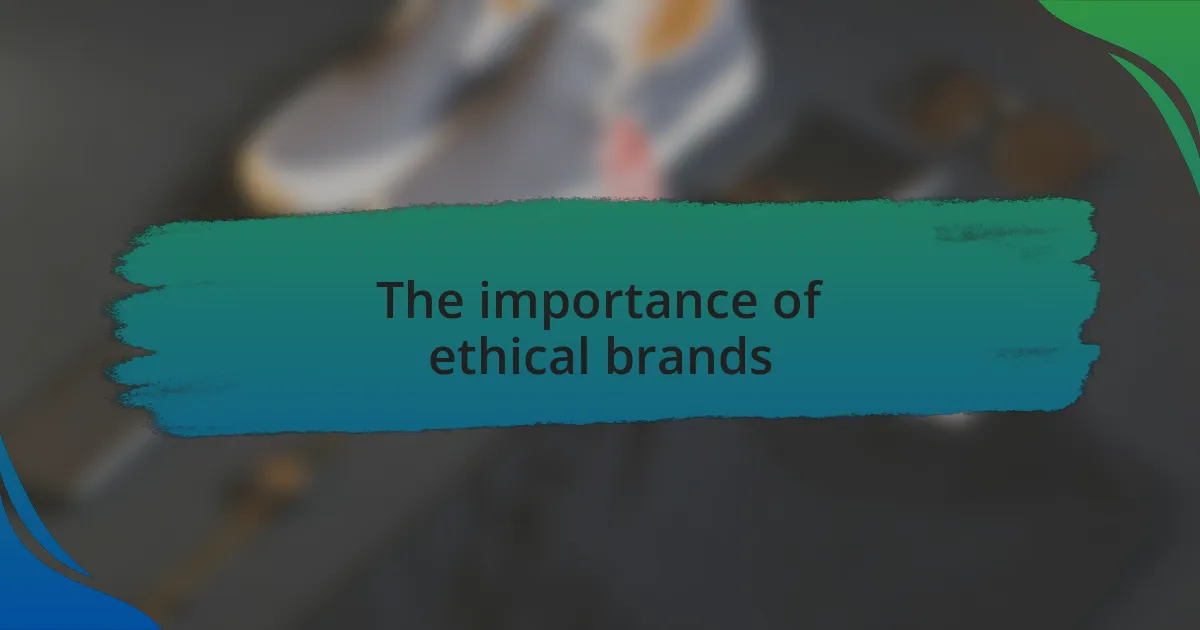
The importance of ethical brands
Ethical brands play a crucial role in shaping a more conscious fashion industry. When I discovered brands that prioritize fair labor practices and sustainable materials, it was like a lightbulb moment. I realized that my purchasing choices could contribute to a more just world, rather than perpetuating harmful cycles.
There’s a deep sense of responsibility that comes with advocating for ethical brands. I remember a time when I purchased a shirt from a company that boasted eco-friendly practices, and it felt different wearing it. It wasn’t just about the style; it was like carrying a small piece of a larger movement. How often do we pause to consider the stories behind our clothes?
Supporting ethical brands also invites transparency into the conversation. I’ve noticed that the more I engage with these brands, the more they share about their processes and values. It transforms shopping from a mundane task to an empowering act of activism. Each piece becomes a conversation starter, sparking dialogue about sustainability and ethics in fashion—something I never expected when I first started my journey.
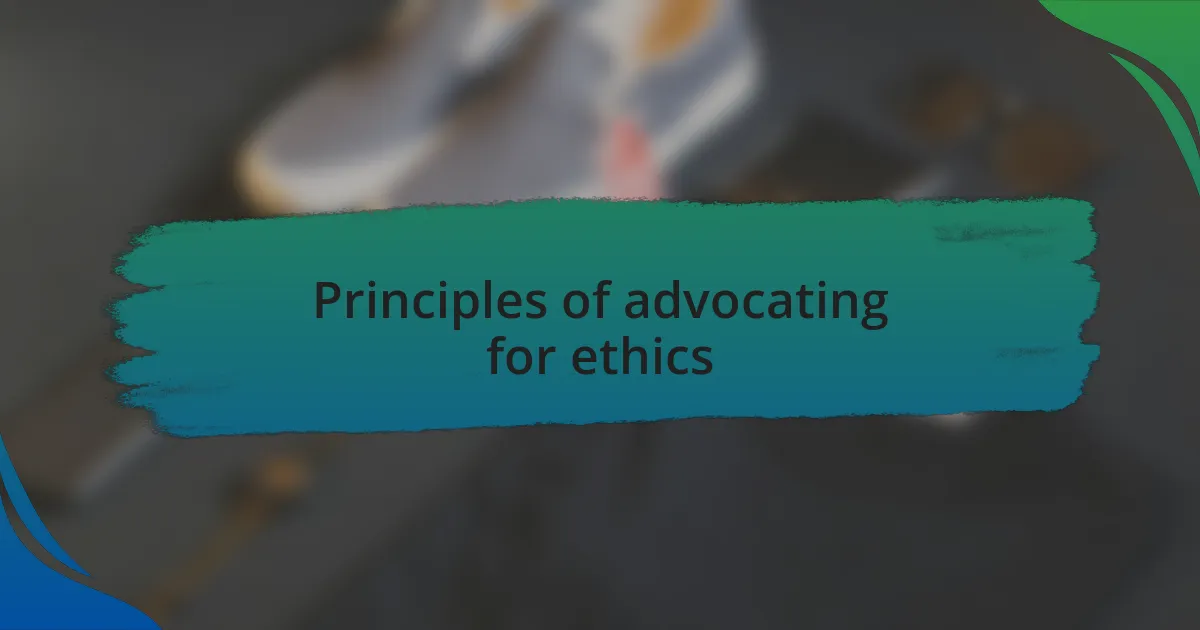
Principles of advocating for ethics
Advocating for ethics in fashion starts with understanding the values that guide our choices. I often reflect on how my upbringing shaped my perspective on consumption. Whenever I purchase clothing, I ask myself: am I supporting businesses that align with my beliefs? This simple question can shift the entire landscape of my wardrobe, encouraging a mindful approach that prioritizes ethical considerations.
Another principle is fostering community and solidarity among like-minded individuals. I recall a spirited discussion with friends at a local café about our favorite ethical brands. It was energizing to swap stories about our sustainable finds and share the joy of supporting businesses that reflect our values. This camaraderie builds a supportive network that amplifies our collective voice, making advocacy not just an individual effort but a community movement.
Education plays a vital role in advocating for ethical brands. I make it a point to share what I learn about the impact of fast fashion on workers and the environment. I remember attending a workshop that illuminated the stark realities of the fashion industry. It ignited a passion within me to inform others, demonstrating how knowledge is a powerful tool in our advocacy arsenal. By spreading awareness, we empower others to make informed choices and join us in the quest for a more ethical future.
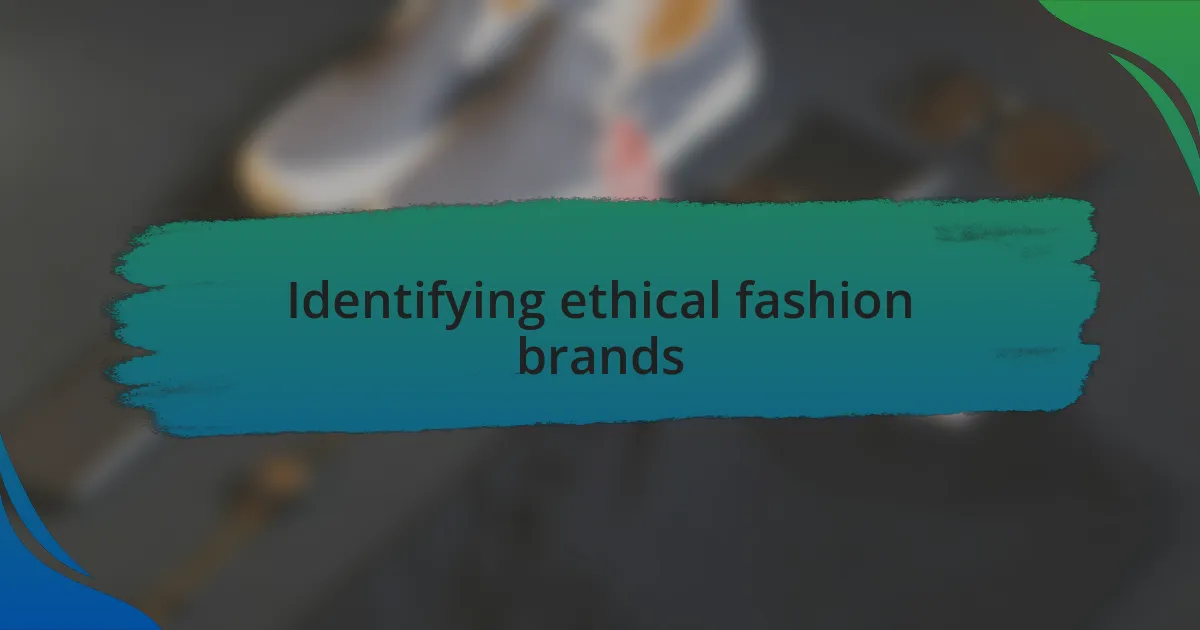
Identifying ethical fashion brands
Identifying ethical fashion brands can sometimes feel overwhelming, yet I’ve developed a few strategies that simplify the process. Whenever I’m in the market for new clothing, I start by checking the brand’s transparency—do they openly disclose their supply chain practices? Last year, while researching, I stumbled upon a brand that provided a detailed breakdown of its production process, which made me feel more confident in my choice to support them. Isn’t it reassuring to know where our clothes come from?
Another crucial aspect I consider is the materials used in the garments. Sustainable fabrics like organic cotton or Tencel not only reduce environmental impact but also often feel better against the skin. When I first discovered a local designer who utilized hemp in their collections, I felt a sense of excitement. It connected me to a larger story of eco-consciousness and innovation, proving that ethical choices can also be stylish.
Lastly, I look for certifications that indicate a brand’s commitment to ethical practices, such as Fair Trade or GOTS (Global Organic Textile Standard). I remember the satisfaction I felt when I found a cozy wool sweater labeled with a certified emblem—little did I know that it represented a promise to workers and the environment. How empowering is it to wear something that aligns with our values? It transforms the act of shopping into a meaningful experience, where every choice resonates with our beliefs.
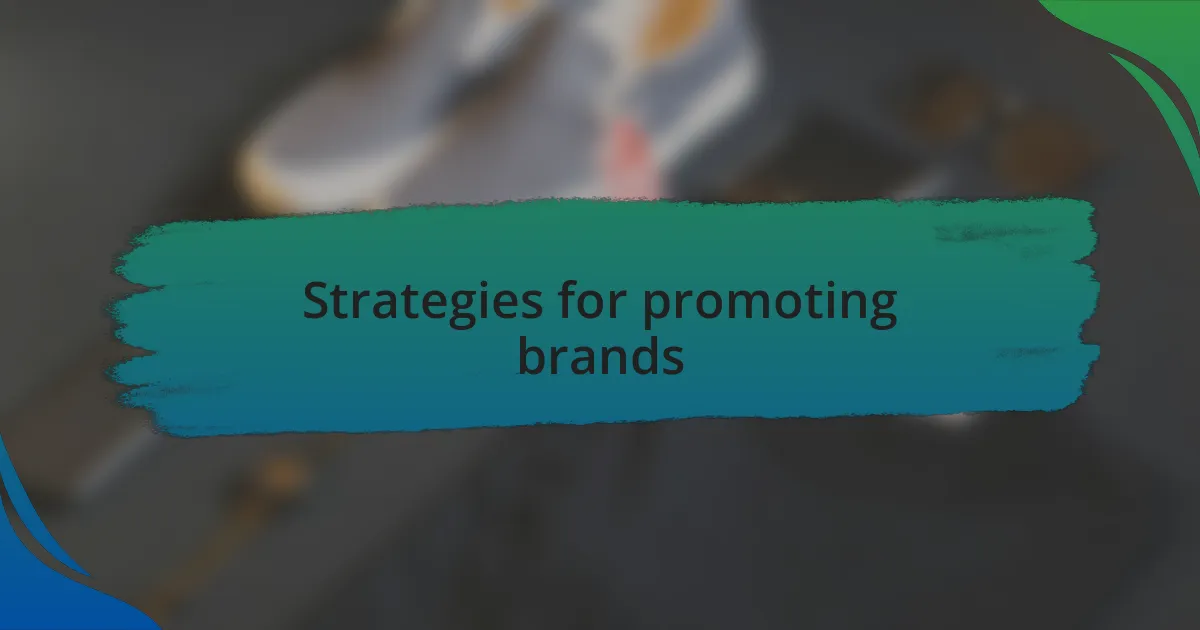
Strategies for promoting brands
Promoting ethical fashion brands is much more than just highlighting their products—it’s about sharing their stories. I often create social media posts that showcase a brand’s unique narrative, transforming their efforts into relatable content. For instance, when I featured a sustainable denim brand that recycles old jeans, I paired it with a personal story of my first pair of jeans from high school, illustrating how our clothing choices evolve.
I also find it effective to engage directly with the brands themselves. By inviting them for a live Q&A session on Instagram, I not only give them a platform to elaborate on their mission but also foster a sense of community among my followers. This interaction often leads to deeper connections, and I remember how one brand shared their journey from a small workshop to a recognized name. It made the audience feel like they were part of something bigger.
Another strategy I value is collaborating with influencers who genuinely support ethical brands. When I teamed up with a local fashion blogger who focuses on sustainable living, we created a campaign that celebrated conscious consumerism. The feedback was heartwarming, as many shared their own journeys towards ethical fashion, showing how collaboration can amplify voices and messages. Isn’t it amazing how shared experiences can inspire others to rethink their fashion choices?
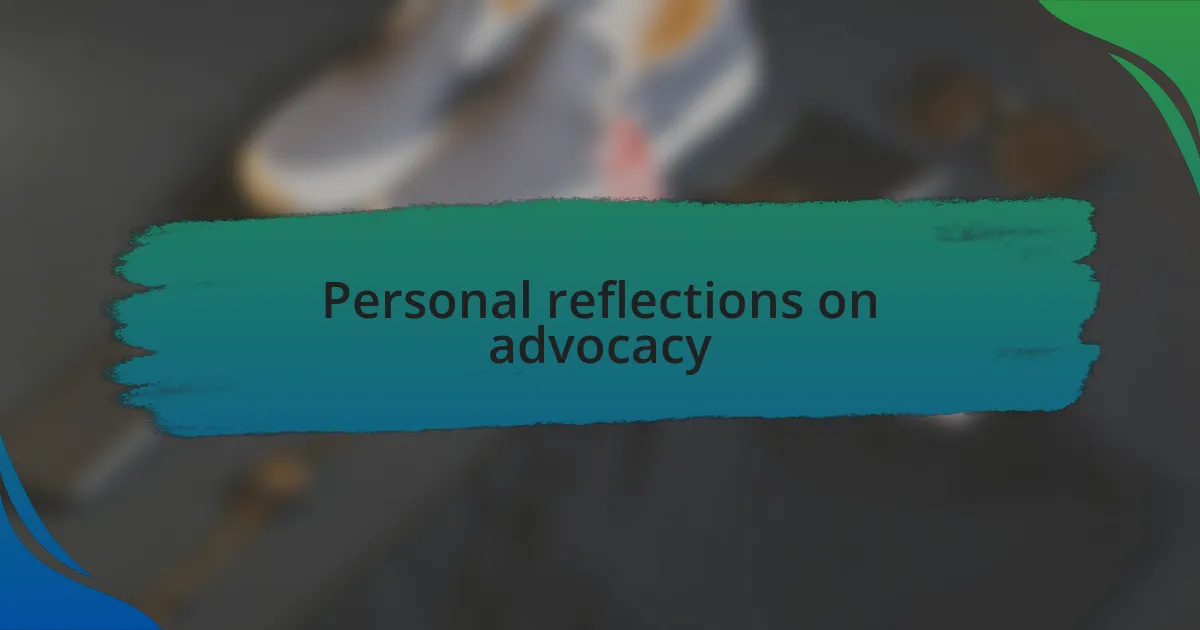
Personal reflections on advocacy
When I think about my journey in advocating for ethical brands, I often recall the first time I wore a piece from a sustainable label. It wasn’t just a clothing choice; it felt like a statement. I remember walking into a café, and a stranger complimented me on my shirt. That simple exchange sparked a conversation about eco-friendly fashion, and I realized how empowering it is to wear something that aligns with my values.
I also reflect on the times I’ve faced pushback when discussing ethical fashion choices. There are moments when people are skeptical, wondering if ethical means sacrificing style or affordability. I’ve taken these opportunities to share my experiences—how I prioritize quality over quantity and how investing in ethical pieces can lead to a more mindful wardrobe. It’s rewarding to see the shift in perspective when someone realizes they can support a cause while still expressing their individuality.
Moreover, I often contemplate the responsibility that comes with being an advocate. I feel a sense of duty to ensure that my platform amplifies diverse voices within the ethical fashion space. It’s essential to me that I highlight brands led by marginalized communities, understanding how representation plays a crucial role in advocacy. Do you share the same passion for uplifting voices that often go unheard? It’s this kind of reflective questioning that fuels my continuous pursuit of promoting a more inclusive conversation around fashion.
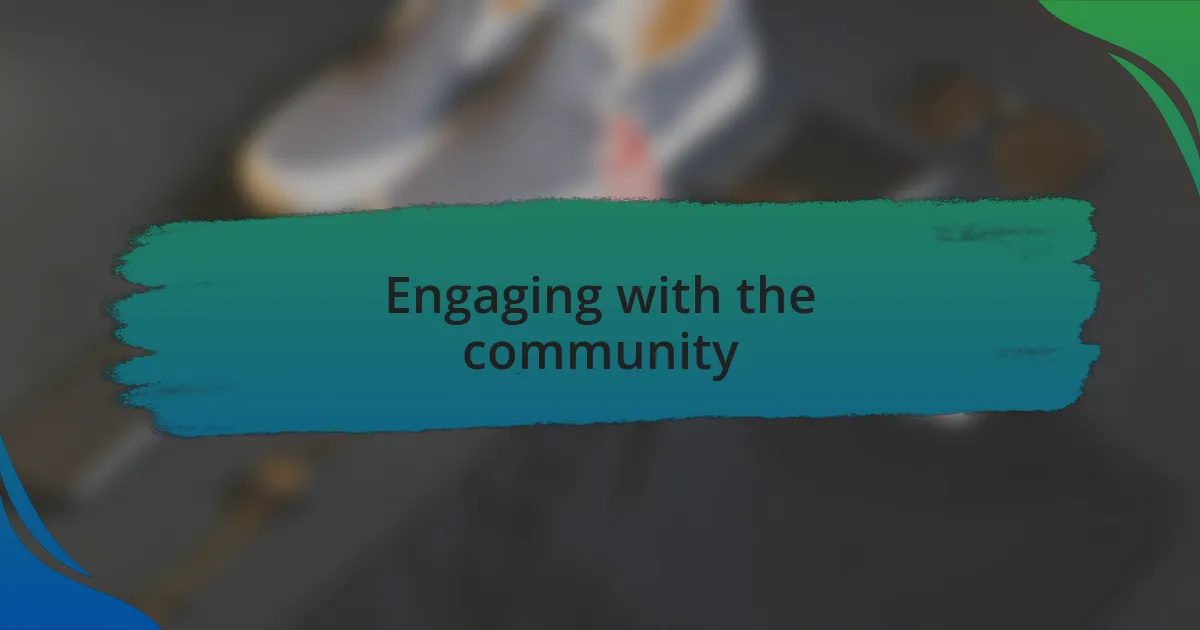
Engaging with the community
Engaging with the community has been a transformative aspect of my advocacy journey. I recall attending a local fashion swap event where I met like-minded individuals who are just as passionate about ethical brands. The energy in the room was infectious, and I realized how much we can learn from each other’s experiences—everything from the brands we love to the challenges we face in making sustainable choices. Have you ever found yourself in a space where you felt an instant connection over shared values? It can be a powerful motivator.
During community outreach initiatives, I often sit down with small business owners who create ethically made products. Listening to their stories, I am reminded of the human element behind each garment—the artisans who pour their heart and soul into their work. I believe it’s crucial to share these narratives because they not only educate consumers but also foster deeper connections with the brands we support. Isn’t it fascinating how personal stories can add a layer of meaning to our purchases?
Additionally, I make it a point to participate in online forums and social media discussions focused on ethical fashion. Engaging with comments or sharing my own insights can feel like a conversation with friends rather than just a digital exchange. This interaction allows me to amplify different perspectives and encourage dialogue about the complexities of ethical consumption. Have you ever felt that thrill when a post resonates or sparks debate? It’s moments like these that reinforce the community’s commitment to change in the fashion industry.